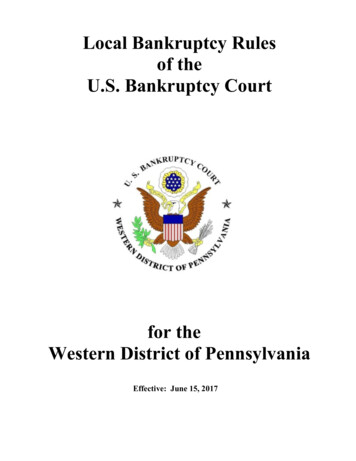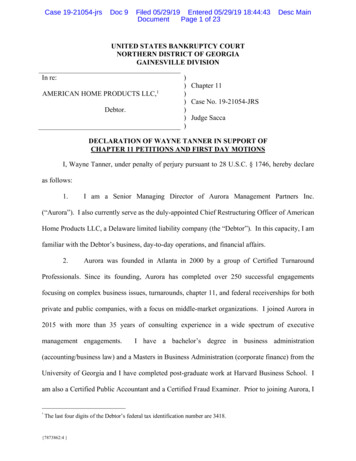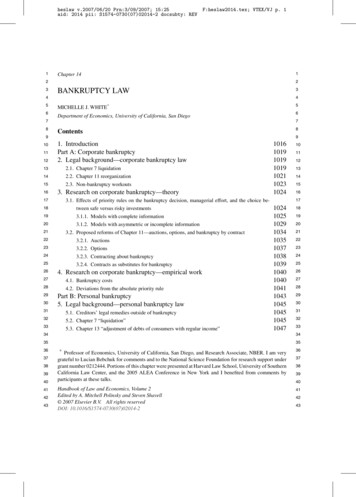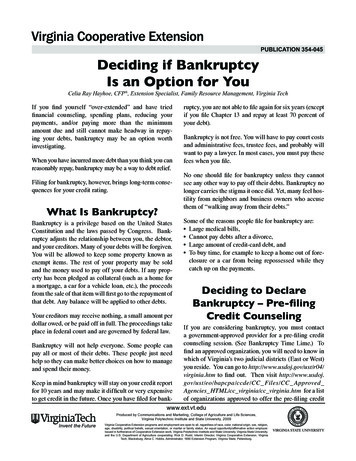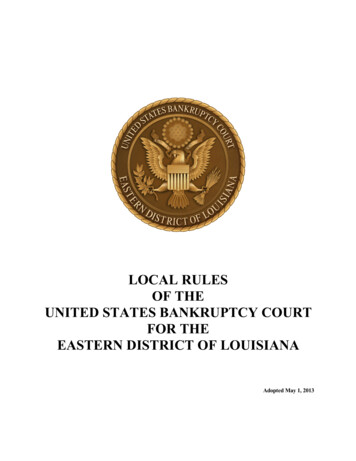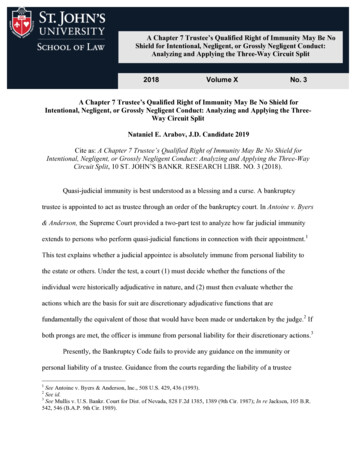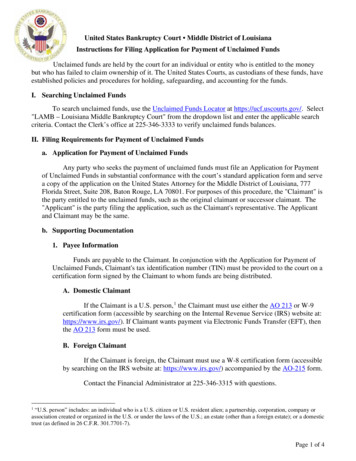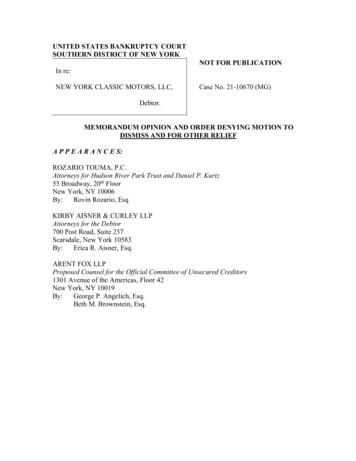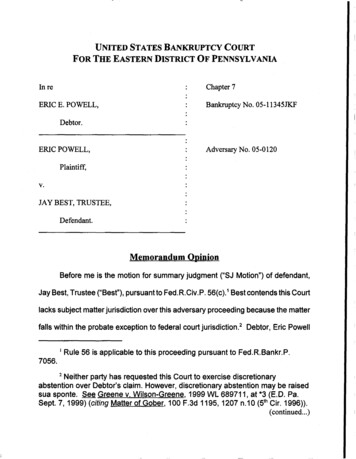
Transcription
UNITED STATES BANKRUPTCY COURTFOR THE EASTERN DISTRICT OF PENNSYLVANIAIn re:Chapter 7ERIC E. POWELL,:Bankruptcy No. 05-11345JKFDebtor.:ERIC POWELL,Adversary No. 05-0120Plaintiff,v.JAY BEST, TRUSTEE,Defendant.Memorandum OpinionBefore me is the motion for summary judgment ("SJ Motion") of defendant,Jay Best, Trustee ("Best"), pursuant to Fed.R.Civ.P. 56(c).1 Best contends this Courtlacks subject matter jurisdiction over this adversary proceeding because the matterfalls within the probate exception to federal court jurisdiction.2 Debtor, Eric Powell1Rule 56 is applicable to this proceeding pursuant to Fed.R.Bankr.P.7056.2Neither party has requested this Court to exercise discretionaryabstention over Debtor's claim. However, discretionary abstention may be raisedsua sponte. See Greene v. Wilson-Greene. 1999 WL 689711, at *3 (E.D. Pa.Sept. 7,1999) (citing Matter of Gober. 100 F.3d 1195, 1207 n.10 (5th Cir. 1996)).(continued.)
("Debtor"), opposes the motion, asserting that his complaint ("Complaint") states aclaim for tortious interference with an inheritance which falls squarely outside of theprobate exception.3 Upon consideration, I conclude that the probate exception doesnot apply to a determination of the validity of the trust, which determination may beall that is necessary to conclude this adversary proceeding and, consequently, thatI have subject matter jurisdiction over it.2(. continued)Upon consideration of the issue and the factors that are relevant thereto, seee.g. Asousa Partnership v. Pinnacle Foods. Inc. fin re Asousa Partnership). 276B.R. 55, 74-75 (Bankr. E.D. Pa. 2002) (listing factors that are relevant to adetermination of whether to exercise discretionary abstention), I decline toexercise my discretion to abstain. Debtor's Chapter 13 Plan is dependent uponthe success of his ability to succeed in this adversary proceeding and it is readyfor trial in this Court; consequently, abstention over this matter will negativelyimpact the efficient administration of his estate. Moreover, this litigation will notbe a burden on this Court's docket and there is no evidence that Debtor wasforum shopping in filing his claim here as opposed to the Orphan's Court.3The Complaint requests that the Court invalidate a trust agreementconcerning certain real property and place title in that property in the Debtor ashaving passed to him through his father's will. At the hearing on this matter onJuly 6, 2006, Debtor requested, in the event subject matter jurisdiction is held tobe lacking, that any dismissal be without prejudice or that he be granted leave toamend the Complaint under Fed.R.Civ.P. 15, incorporated herein byFed.R.Bankr.P. 7015, to specifically state a claim for tortious interference with aninheritance (assuming that he had not done so) which would, he asserts, bewithin the Court's subject matter jurisdiction.-2-
BACKGROUND4In 1987, Debtor's father ("Father") and his wife purchased a property at 1229President Street, Unit A-1, Brooklyn, New York (the "New York Property"). OnNovember 28,1995, Debtor's father ("Father") signed his Last Will and Testament("the Will") naming Debtor as the executor of his estate and, in the event his wifepredeceased him, as his sole heir.5 See Exhibit B to Motion. On April 29, 1998,Father allegedly executed a Special Power of Attorney authorizing the Debtor toexecute any instruments on his behalf.6 Complaint fl6. Father's wife died in4Pursuant to the parties' consent at the hearing, the record on the Motionincludes the exhibits attached to Defendant's Memorandum of Law in Support ofDefendant's Motion for Summary Judgment ("SJ Memorandum"), PlaintiffsMemorandum of Law in Opposition to the Motion of the Defendant for SummaryJudgment in his Favor (the "Response") and Defendant's Reply Memorandum inSupport of Summary Judgment (the "Reply").I have also taken judicial notice of the dockets and undisputed facts in theSchedules and Statement of Financial Affairs from the Debtor's bankruptcycases. Courts are permitted to take judicial notice of the docket and content ofbankruptcy schedules for the purpose of ascertaining the timing and status ofevents in a debtor's bankruptcy case and facts not reasonably in dispute. SeeFed.R.Evid. 201, incorporated into this proceeding pursuant to Fed.R.Bankr.P.9017. See In re Indian Palms Associates. Ltd. 61 F.3d 197, 204-206 (3d Cir.1995); Asousa Partnership v. Manufacturers Alliance Insurance Co. (In re AsousaPartnership). 2005 WL 2857983, at *4 n.9 (Bankr. E.D. Pa. 2005).5Father named his wife as his sole heir. However, in the event his wifepredeceased him, Father named Debtor as his sole heir. See Exhibit B to SJMemorandum. In the event both his wife and Debtor predeceased him, Fathernamed Debtor's sister, Nina Cohen ("Nina"), as his sole heir. See Id.6At Debtor's deposition, he testified that his Father was incompetent whenhe signed the Special Power of Attorney. See Exhibit G to Reply. Whether(continued.)-3-
December of 1998. Complaint & Answer and Affirmative Defenses of Defendant JayBest to the Adversary Complaint of Plaintiff, Eric Power ("Answer") at 1J7. On March22, 2001, Father signed an Agreement and Declaration of Trust (the "Trust")transferring title of the New York Property to Best, as trustee, for the benefit ofDebtor's sister, Nina, and her husband, Mendel Cohen (Nina and Mendel Cohenshall be collectively referred to as the "Cohens"), who, apparently, had been livingin the New York property since its purchase. See Answer and Exhibit C to SJMemorandum.Father died in October of 2001. Complaint & Answer fl10. On July 25, 2003,Debtor obtained a Decree of Probate and Letters Testamentary for the Will from theRegister of Wills for Philadelphia County.See Defendant's Exhibit D toSJ Memorandum.On August 4, 2003, less than two weeks after obtaining the LettersTestamentary, Debtor filed his first Chapter 13 bankruptcy case. Bankruptcy CaseNo. 03-31608, Docket Entry No. 1.7 In January of 2004, the Chapter 13 Trustee6(.continued)Debtor is correct about his Father's mental competence when he signed thedocument is irrelevant to my ruling regarding subject matter jurisdiction.7In his first bankruptcy case, Debtor listed only one piece of real property,namely the home in which he resides at 8526 Castor Avenue in Philadelphia,Pennsylvania (the "Pennsylvania Property"), on his Schedule A ("Real Property").While the Pennsylvania property remained in his Father's name, Debtor listed itas belonging to him based on his "[ejquitable interest" in the property as the soleheir to his Father's estate. Bankruptcy Case No. 03-31608, Schedule A. Debtor(continued.)-4-
moved to dismiss the bankruptcy case contending that Debtor failed to make timelypayments under his Chapter 13 plan and that the plan was not feasible. BankruptcyCase No. 03-31608, Docket Entry #20. On February 6,2004, a hearing was held onthe motion to dismiss as well as on confirmation of the plan and Debtor's firstbankruptcy case was dismissed, id.,Docket Entry #25. The case was closed onMarch 12, 2004.On February 3, 2005, Debtor filed his second Chapter 13 bankruptcy case.8Bankruptcy Case No. 05-11345, Docket Entry #1. On February 21, 2005, hecommenced the instant adversary proceeding by filing a Complaint. In theComplaint, Debtor alleges that the Cohens "fraudulently induced" Father to deed theNew York Property to Best by having him sign the Trust when: (i) his "mentalfaculties" were diminished; (ii) he was incompetent to contract; and (iii) he wasincapable of voluntarily executing the Trust because of the Special Power ofAttorney. See Complaint 1flJ1, 9, and 12. Based on these allegations, Debtorcontends that the Trust is "voidable" in favor of Father's estate. ]d. TI1J13. Since he7(.continued)did not list or otherwise mention the New York Property on his Schedules orStatement of Financial Affairs.8On Schedule A in his current bankruptcy case, the Debtor listed both thePennsylvania Property (again stating that while the property remains in hisFather's name, he possesses an equitable interest in it as his Father's sole heir)and the New York Property. Explaining the nature of his interest in the New YorkProperty, Debtor stated that he "claims ownership" in the property as his Father'ssole heir but that "his sister and her husband claim ownership under a trustexecuted by [his Father]." Schedule A.-5-
is the personal representative and sole beneficiary of his Father's estate, Debtoralleges that title to the New York Property should be quieted in him. Id. 5114-15.In the first paragraph of the Complaint, Debtor identifies the reason hecommenced this proceeding, stating:1.This proceeding is brought by theDebtor, . the sole legatee of his latefather,. to quiet title of [the Property].Complaint 1J1 (italics added). In the last paragraph of the Complaint and his prayerfor relief, Debtor similarly states:15.Title to the Property should thereforebe quieted in the Debtor, who intendsto sell the Property to pay off themortgage under the terms of hisChapter 13 Plan.WHEREFORE, the Debtor requests that this court will enter anorder quieting the title of the Property in him.id. 1f15 & Prayer for Relief (italics added).Trial on the Complaint was originally scheduled for October 18, 2005.However, as a result of four amendments to the Pretrial Order, the trial wascontinued until July 19,2006.9 On May 11,2006, Best filed a motion to bifurcate thesummary judgment issues in the proceeding between: (i) the probate exception to9The Pretrial Order was amended three times pursuant to stipulations ofthe parties. The Pretrial Order was amended the fourth time in response to thea motion by Debtor for an enlargement of time.-6-
federal court jurisdiction; and (ii) other issues.On May 16, 2006, the motion tobifurcate was granted.After the SJ Motion was filed, Best filed an expedited motion to extend thedates of the latest Amended Pretrial Order. On June 28,2006, the expedited motionwas granted and the July 19th trial date was cancelled, to be rescheduled uponfurther court order. The hearing on the Motion was held and the matter was takenunder advisement.Best contends that summary judgment should be granted because the subjectmatter of this adversary proceeding falls within the probate exception to federaljurisdiction which the Supreme Court discussed in Marshall v. Marshall.126 S. Ct. 1735 (2006).U.S.,Debtor opposes the SJ Motion, arguing that, since hisaction is a claim for tortious interference with an inheritance as described inRestatement (Second) of Torts §774(B) (1979),10 the action is outside of the "probateexception" and within the subject matter jurisdiction of this Court. Response at 6.10Section 774B states:One who by fraud, duress or other tortious meansintentionally prevents another from receiving from athird person an inheritance or gift that he wouldotherwise have received is subject to liability to theother for the loss of the inheritance or gift.Restatement (Second) of Torts §774B (1979).-7-
DISCUSSIONI.Legal Standard for Defense ofSubject Matter JurisdictionA defendant may raise a court's lack of subject matter jurisdiction as adefense at any time under Rule 12(h)(3) of the Federal Rules of Civil Procedure. SeeFed.R.Civ.P. 12(h)(3)11 ("Whenever it appears by suggestion of the parties orotherwise that the court lacks jurisdiction of the subject matter, the court shalldismiss the action."). See also Kaiser Group International. Inc. 399 F.3d 558, 565(3d Cir. 2005) ("It is well-settled law that subject matter jurisdiction can bechallenged at any point before final judgment, even if challenged for the first time onappeal."). However, the defense should not be raised as a basis for summaryjudgment. See Navios Corporation v. National Maritime Union of America. 359 F.2d853,659 (3rd Cir. 1966) ("A motion for summary judgment is improper when mattersin abatement such as lack of jurisdiction are advanced."). If a bankruptcy court lackssubject matter jurisdiction over a proceeding, it has no authority to decide theproceeding on the merits, Marburaer v. Upper Hanover Township. 225 F. Supp.2d503, 504 (E.D. Pa. 2002) (citing Orthopedic "Bone Screw" Products LiabilityLitigation. 132 F.3d 152,155 (3rd Cir. 1997)), and consequently, no authority to grantsummary judgment against the plaintiff, Facha v. Cisneros. 914 F. Supp. 1142,1146(E.D. Pa.), affd. 106 F.3d 384 (3d Cir. 1996). Nevertheless, a motion for summary"Rule 12(h)(3) is applicable to this proceeding pursuant to Fed.R.Bankr.P.7012(b).-8-
judgment based on subject matter jurisdiction may be treated as a motion underRule 12(h)(3). See Solomon v. Solomon. 516 F.2d 1018, 1027 (3d Cir. 1975)("Under Rule 12(h)(3) of the Federal Rules of Civil Procedure (28 U.S.C.), lack ofsubject matter jurisdiction should be raised and adjudicated by a motion to dismiss,not a motion for summary judgment."); Navios Corporation. 359 F.2d at 659 (quoting6 Moore's Federal Practice 1J56.03, p. 2027 (2d ed. 1953) ("'a motion for summaryjudgment for lack of jurisdiction over the subject matter may be treated and disposedof as a motion to dismiss'"); Facha. 914 F. Supp. at 1146 (treating motion forsummary judgment as a motion to dismiss for lack of subject-matter jurisdiction).When a defendant contests the subject matter jurisdiction of a court, the partyasserting subject matter jurisdiction has the burden of proving its existence. CarpetGroup International v. Oriental Rug Importers Association. Inc. 227 F.3d 62,69 (3dCir. 2000). Since Best has asserted a factual as opposed to a facial challenge tothis Court's subject matter jurisdiction, I may consider matters outside of thepleadings in ruling on his Motion. See id. ("When a defendant attacks subject matterjurisdiction "in fact," as opposed to an attack on the allegations of the complaint, theCourt is free to weigh the evidence and satisfy itself whether it has the power to hearthe case."). I have relied upon this principle in determining the relevant facts as setforth above. See supra n.4.-9-
II.Whether Debtor's Claim is an Action forTortious Interference with an InheritanceFirst we shall turn to the question of whether this matter can berecharacterized so that it is outside the scope of the probate exception. Debtorcontends that his claim is not within the probate exception because it "falls squarely"within the definition of a claim for tortious interference with inheritance, as set forthin the Restatement of Torts (Second) §7746, which the Supreme Court specificallyruled in Marshall is the type of claim that falls "outside of the narrow scope of theprobate exception." Response at 6. Even were we inclined to torture the Complaintto read it as sounding in tort, this contention would be erroneous.Pennsylvania law does not provide for recovery under a claim for tortiousinterference with contract "on the basis of inter vivos transfers alleged to diminish aneventual bequest."Estate of Cletus J. Hollywood v. First National Bank ofPalmerton. 859 A.2D 472 (Pa. Super. 2004). Rather, Pennsylvania law limits the"parameters" of such claims to "instances involving demonstrable interference withthe testamentary scheme the decedent had sought to create by making changes inan existing will." Estate of Cletus J. Hollywood v. First National Bank of Palmerton.859 A.2D 472 (Pa. Super. 2004). As the Third Circuit noted in Golden, supra, theelements in Pennsylvania for a claim of tortious interference with inheritance are thefollowing:1212Neither party contends that any state law other than Pennsylvania(continued.)-10-
(1)The testator indicated an intent to change his will toprovide a described benefit for plaintiff;(2)The defendant used fraud, misrepresentation orundue influence to prevent execution of theintended will;(3)The defendant was successful in preventing theexecution of the new will; and(4)But for the Defendant's [sic] conduct, the testatorwould have changed his will.382 F.2d at 364 (quoting Cardenas v. Schober. 783 A.2d 317, 326 (Pa. Super.2001)) (correction in 3rd Circuit decision). See also Arena v. McShane. 150 Fed.Appx. 165, 166-67 (3d Cir. 2005) (quoting Cardenas. 783 A.2d at 326 (citingMarshall v. De Haven. 209 Pa. 187, 58 A. 141, 142 (1904)). Based on theseelements, Pennsylvania law requires a plaintiff stating a claim for allegedinterference with inheritance to "demonstrate" that "the decedent has sought to makechanges to his will to plaintiffs benefit, and that the defendant, through means offraud, misrepresentation, or undue influence thwarted the decedent's intent." Estateof Cletus J. Hollywood, supra. 859 A.2d at 478.Based on the Complaint'sallegations, Debtor has not, and cannot, state such a claim here.12(.continued)applies to the Debtor's action. Rather, both parties cite to Pennsylvania law insupport their respective positions. See Marshall v. Marshall. 275 B.R. 5, 50 n.3(C.D. Cal. 2002) (assuming that the law of Texas applied to the parties' disputebecause neither party contended that anything but such law applied), adoptedas modified by, 275 B.R. 5 (C.D. Cal. 2002), vacated and remanded, 392 F.3d1118 (2004), reversed and remanded, 126S. Ct. 1735,U.S.(2006).-11-I
III.The Supreme Court's Decision in Marshall v. Marshallon the Probate Exception to Federal JurisdictionBest supports his contention that subject matter jurisdiction is lacking by citingthe recent decision of Marshall v. Marshall, supra, wherein the Supreme Courtdiscussed the contours of what it labeled as the "narrow" probate exception tofederal jurisdiction. 126 S.Ct. at 1744. The Supreme Court ruled that the NinthCircuit Court of Appeals had interpreted the exception too broadly when it held thatthe exception prevented the bankruptcy court from deciding a claim for tortiousinterference in an adversary proceeding before it.The debtor in Marshall was Vickie Lynn Marshall ("Widow"), also known asAnna Nicole Smith, who survived her very wealthy older husband, J. HowardMarshall, II. id. at 1741. One of her husband's sons (the "Son") was the beneficiaryof his estate, id. at 1742. While her husband's estate was subject to ongoingproceedings in the probate court caused by various claims to his fortune, the Widowfiled a Chapter 11 bankruptcy case. Jd. The Son filed a proof of claim against theWidow for allegedly defaming him; she answered his claim and asserted acounterclaim against him, including a claim that he had tortiously interfered with agift she had expected from her late husband.13 id.13Since Widow included a counterclaim in her objection to Son'sdefamation claim, it became an adversary proceeding pursuant to Fed.R.Bankr.P.3007. Id.-12-
The bankruptcy court granted summary judgment in favor of the Widow on theSon's claim and, following a trial on the merits, entered final judgment in her favoron her tortious interference claim. Id- In a post-trial motion and on appeal, the Sonclaimed lack of subject matter jurisdiction. Neither the bankruptcy court nor thedistrict court ruled in his favor on this issue, id. Like the bankruptcy court,14 thedistrict court also granted judgment on the Widow's claim in her favor and againstthe Son. id. at 1743-44. The Son subsequently appealed to the Ninth Circuit.On appeal, the Ninth Circuit reversed, concluding that the probate exceptionbarred federal jurisdiction.Id- at 1744. It reasoned that "a claim falls within theprobate exception if it raises 'questions which would ordinarily be decided by aprobate court in determining the validity of the decedent's estate planning"instrument," whether those questions involve 'fraud, undue influence [or,] tortiousinterference with the testator's intent.'" 126 S.Ct. at 1744 (quoting Marshall v.Marshall. 392 F.3d at 1118,1133 (9th Cir. 2004)).In reversing the Ninth Circuit and clarifying the limits of the probate exception,the Supreme Court interpreted the following two paragraphs from a decision which,14The district court held that the bankruptcy court did not have corejurisdiction to enter a final judgment on the Widow's claim so it treated thebankruptcy court's decision as proposed findings of fact and conclusions of law.Marshall v. Marshall. 275 B.R. 5,10 (C.D. Cal. 2002), vacated and remanded by392 F.3d 1118 (9th Cir. 2004), reversed and remanded byU.S., 126 S.Ct.1735(2006).-13-
despite its having been issued in 1946, was the Supreme Court's "most recentpronouncement of the probate exception:"It is true that a federal court has no jurisdiction toprobate a will or administer an estate . But it has beenestablished by a long series of decisions of this Court thatfederal courts of equity have jurisdiction to entertain suits"in favor of creditors, legatees and heirs" and otherclaimants against a decedent's estate "to establish theirclaims" so long as the federal court does not interfere withthe probate proceedings or assume general jurisdiction ofthe probate or control of the property in the custody of thestate court.Similarly, while a federal court may not exercisejurisdiction to disturb or affect the possession or propertyin the custody of the estate court, . it may exercise itsjurisdiction to adjudicate rights in such property where thefinal judgment does not undertake to interfere with thestate court's possession save to the extent that the statecourt is bound by the judgment to recognize the rightadjudicated by the federal court.Markham v. Allen. 326 U.S. 490, 494 (1946) (citations omitted) (italics added).The Supreme Court began its interpretation of these paragraphs by focusingon the first paragraph which it observed was not "a model of a clear statement."Marshall. 126 S. Ct. at 1747-48 (italics added).Explaining this paragraph, theSupreme Court stated: "[F]ederal courts have jurisdiction to entertain suits todetermine the rights of creditors, legatees, heirs, and other claimants against adecedent's estate 'so long as the federal court does not interfere with the probateproceedings." id. at 1748 (italics added by Supreme Court) (quoting Markam v.Allen. 326 S. Ct. at 494). Recognizing that lower courts had long been puzzled over-14-
the meaning of the phrase "interfere with the probate proceedings" and,consequently, have read the "words to block federal jurisdiction well beyond probateof a will or administration of a decedent's estate," the Supreme Court explained thatthe phrase proscribes "'disturb[ing] or affect[ing] the possession of property in thecustody of a state court." Marshall. 126 S. Ct. at 1748 (quoting Markham v. Allen.326 U.S. at 494). Noting that this interpretation "renders the first-quoted passagein part redundant," the Supreme Court reasoned that "redundancy is preferable toincoherence." Jd. at 1748. Restating its point, the Supreme Court stated that the"'interference language'" is "essentially a reiteration of the general principle that,when one court is exercising in rem jurisdiction over a res, a second court will notassume in rem jurisdiction over the same res." idThe Supreme Court then summarized the confines of the probate exception,instructing:Thus, the probate exception reserves to state probatecourts the probate or annulment of a will and theadministration of a decedent's estate; it also precludesfederal courts from endeavoring to dispose of property thatis in the custody of a state probate court. But it does notbar federal courts from adjudicating matters outside thoseconfines and otherwise within federal jurisdiction.Id.Applying these principles of the probate exception, the Supreme Courtconcluded that the Widow's claim was not within the probate exception because itdid not "involve the administration of an estate, the probate of a will, or any otherpurely probate matter." id. In so concluding, the Supreme Court specifically relied-15-
upon the following four characteristics of the Widow's claim: (i) the claim alleged awidely recognized tort under the Restatement (Second) of Torts § 774B (1979); (ii) itsought an in personam judgment against the Son rather than the probate orannulment of a will; (Hi) it did not seek to reach a res in the custody of a state court;and (iv) it required no special proficiency to handle. ]d. at 1748-49.The Supreme Court also addressed one additional major point which issignificant here. It emphasized thatstate legislation cannot impair federaljurisdiction. On this point, the Supreme Court noted that it had previously held that"the jurisdiction of the federal courts, 'having existed from the beginning of theFederal Government, [can]not be impaired by subsequent state legislation creatingcourts of probate.'" id. at 1749 (quoting McClellan v. Garland. 217 U.S. 268, 281(1910)(upholding federal jurisdiction over action by heirs of decedent, who diedintestate, to determine their rights in the estate). This observation by the SupremeCourt also was noted by the Third Circuit in Golden v. Golden. 382 F.3d 348 (3d Cir.2004), which also focused on the probate exception.At dispute in Golden was a will that transferred all of the decedent's propertyto a trust which she created while she was alive. 382 F.3d at 352-53. She namedherself as the trustee; upon her death, her son became the sole trustee. Id. Underthe terms of the trust, the trust corpus was, upon her death, to distributed in threeequal shares to her beneficiaries. Jd. However, while she was bedridden and underhospice care, she purportedly executed the addendum revising her testamentary-16-
scheme to increase the legacy granted to the son who was named as the trusteeand decrease the legacy granted to the other two beneficiaries. ]d.The trust in Golden was an inter vivos trust since it was created during thedecedent's lifetime rather than by a will. See Blacks Law Dictionary 826-27 (7th ed.1999) (definition for "inter vivos"). See also 20 Pa.C.S.A. § 711 (3) ("'Inter vivos trust'means an express trust other than a trust created by a will, taking effect during thelifetime or at or after the death of the settlor.");15 Peter Nicoulas, Fighting the ProbateMania: A Dissection of the Probate Exception to Federal Court Jurisdiction, 74 S.Cal. L. Rev. 1479, 1492-93 (September, 2001) (explaining that an inter vivos trustis "created and take[s] effect during the settlor's lifetime" whereas a testamentarytrust does not take effect "until the settlor dies."). In the same vein, the trust at issuein the instant case is an inter vivos trust; it was executed by Father and took effectduring his lifetime. Most importantly, however, the Trust does not provide for thedistribution of the Trust property upon the death of either the grantor, Father, or theBeneficiaries, the Cohens. Exhibit C to SJ Motion.15Section 711 (3) specifically recognizes that the term "inter vivos trust"does not include "a resulting or constructive trust created by operation of law."20 Pa.C.SA §711(3). As one of his defenses to Debtor's claim that the trust isnot valid, Best asserts that the a constructive trust of the New York Propertyexists in the Cohen's favor. Since constructive trusts are not even included in theterm "inter vivos" under §711 (3), this defense has not been legislated as being inthe orphan's court jurisdiction. Neither party has argued to the contrary.-17-
The relevant issue in Golden was whether the probate exception applied tothe appellants' action which sought, through various theories, to challenge thedistribution of assets from the decedent's estate. Golden, supra. 382 F.3d at 357.The parties presented categorical arguments on this issue, id- at 360. Theappellant argued that actions involving inter vivos trusts are never subject to theprobate exception because it only applies to wills and not to trusts regardless ofwhether "the trust operates as a will, distributing the corpus upon the death of thesettlor." Id. at 359. The appellee disagreed, contending that, under Pennsylvanialaw, the probate exception perse applied to all of the appellant's claims because 20Pa.C.SA §711(3) vests the Orphan's Court with jurisdiction to administer andoversee actions seeking to reform inter vivos trusts, jd. at 359-60. Section 711(e)of Pennsylvania's statutory law provides, in pertinent part, that jurisdiction over the"administration and distribution of the real. property of inter vivos trusts and thereformation or setting aside of such trusts" resides in the Orphan's Court. See 20Pa.C.SA §711 (3).1616Section 711(3) states:[T]he jurisdiction of the court of common pleas over thefollowing shall be exercised through its orphan's courtdivision:* **(3) Inter vivos trusts. - The administration and(continued.)-18-
The Third Circuit rejected both of the parties' viewpoints. Id- at 359-60. TheThird Circuit ruled that actions involving inter vivos trusts are not categoricallyoutside of the probate exception, but also that the probate exception does not applycategorically to all claims involving the reformation of inter vivos trusts. Id- In soconcluding, the Third Circuit opined that a "state's interest in managing allchallenges addressing an estate res located in that state or with which the state hassome meaningful connection. is no less compelling if the res is distributed by trustrather than by will." ]d. at 359 (emphasis in original). While the Third Circuit'sreference to "all challenges addressing an estate res" now would be overly broadgiven the Supreme Court's clarification in Marshall of the narrow nature of theprobate exception, the Third Circuit's rationale, that causes of action involving trustswhich distribute estate assets are treated under the probate exception in the sameway as actions involving wills, remains viable. Id. at 359.In rejecting the appellee's "opposite categorical position" that the probateexception applied to all of the appellants' claims under §711(3), the Third Circuitexplained that the fact that a trust is involved does not automatically render the16(.continued)distribution of the real and personal property
Bankruptcy Case No. 03-31608, Docket Entry #20. On February 6,2004, a hearing was held on the motion to dismiss as well as on confirmation of the plan and Debtor's first bankruptcy case was dismissed, id.,Docket Entry #25. The case was closed on March 12, 2004. On February 3, 2005, Debtor filed his second Chapter 13 bankruptcy case.8

